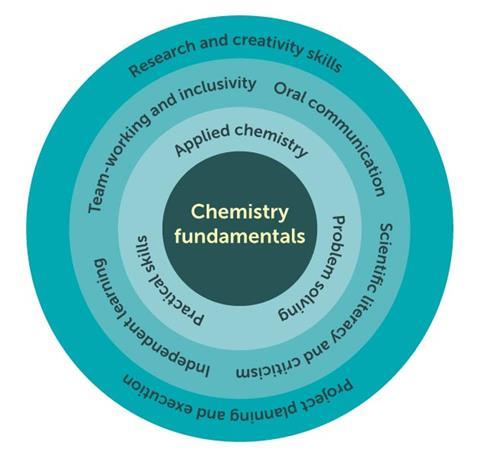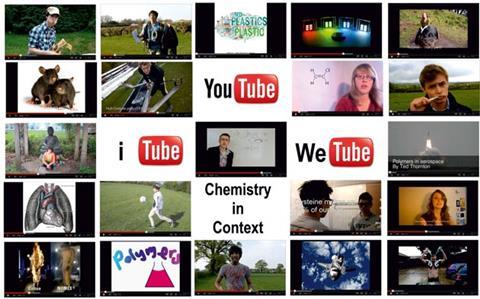David Smith discusses the importance of employability skills for chemists

Employability skills: words that induce extended rants from some senior academics about how they never needed such things and turned out just fine – shortly before they stroll late into the auditorium to deliver an impenetrable lecture or shout at their research team to work harder. Obviously, this is an extreme stereotype, but it sadly has some basis in truth. Would science really be in a worse position if researchers had the ability to communicate both orally and in writing, and worked in an inclusive manner within teams? But how can such skills be developed, and would doing so distract from teaching core chemical knowledge?
As university educators, we spend a long time considering the ‘programme design’ of our curriculum, but how often do we think beyond the chemistry knowledge that our students require? Other skills are often neglected or simply bolted on as an after-thought. In the worst cases, it is hoped that students will magically develop such skills or inherently have them, placing students from less privileged backgrounds or different cultures at a significant disadvantage.
In 2010, a report from Steve Hanson and Tina Overton (pdf) clearly advocated skills provision for chemistry undergraduates, but as yet, many departments have not addressed this issue. As I emphasised in a recent Education in Chemistry article, it is these high-level skills that ensure students go on to be successful in later life, either in chemical research or more general graduate-level jobs.
In terms of chemistry, nobody would question that students must develop their understanding of stereochemistry and conformational analysis before starting advanced asymmetric synthesis. Surely, therefore, students also need to build other skills through structured and carefully designed experiences. It would seem logical that we should ‘programme design’ our skills provision in the same way we structure our chemistry curriculum. We have been attempting this in my own department at the University of York, and in this article, I reflect on the process.
Some universities provide centralised or generic employability skills. In my opinion, this often fails students as it does not harness their subject passion, leaving them disengaged. Our underlying principle was that all skills should be taught within a clear chemistry context, enabling students to see their relevance and use skills development to support and enhance their understanding of key chemical principles.
To create our contextualised programme, we aimed to develop skills progressively by embedding specific activities at key points in the degree. On an individual level, many of the activities are not unique and are present in degrees at other universities. However, the key aspect is scaffolding them into a coherent whole.
The perfect graduate
We started our programme design by creating a checklist of skills for the ‘perfect’ graduate.
- Excellent knowledge of core chemistry
- Appreciation of applications and impacts of chemistry
- High-level practical skills
- Problem-solving and quantitative skills
- Independent learning and thinking skills
- Oral communication skills
- Scientific writing skills to address a variety of audiences
- Critical comprehension of research papers
- Effective team-working
- Appreciation of inclusivity
- Research and creativity – ability to plan/execute complex projects
Considering these skills as a coherent whole led to the creation of Figure 1, which is effectively a modified version of Bloom’s taxonomy. Unlike the original, this revised taxonomy explicitly recognises the vital importance of key skills as a discrete and important layer in the learning process; vital if students are going to be successful in translating their fundamental knowledge into original creative research. I believe this new taxonomy better reflects the role of skills in learning and will encourage their integration into programme design.

Fundamental chemistry
The focal point of any chemistry degree is an emphasis on core chemistry – teaching the fundamentals well. This needs little further elaboration except to say we support this with regular small-group teaching in ‘chemistry colleges’. During these, students in groups of five develop problem-solving and communication skills, and engage with academic staff. Our ‘college’ teaching is exclusively formative and is the single most important way our students consolidate and expand fundamental understanding from lectures, embedding the chemistry fundamentals within the wider learning context of Figure 1. Chemistry colleges also provide pastoral support and help structure our peer-to-peer mentoring scheme, with senior students volunteering to advise first years and run revision classes (in turn developing their own understanding and skills).
It was so satisfying seeing the final video challenging myself and learning new skills.
Building on fundamental chemistry, students select context-led chemistry option modules to enrich their curriculum, for example addressing medicinal, environmental or industrially-relevant chemistry. These options allow students to explore applications of chemistry and discover its impact in a real-world context – vital skills for a modern scientist, or indeed any scientifically literate member of society.
As in any modern chemistry degree, coherent development of practical chemistry skills is vital. Our students spend full working days in the lab rather than performing shorter exercises. This prepares students for a realistic working environment. Combined with pre-lab online work, it also helps them to think critically, and plan and design experiments, instead of just rushing through practical manipulations. An innovative lecture course teaching chemical health and safety also supports practical work. Formally assessed via online tests, this helps develop personal responsibility for experimental planning and active risk management – vital skills for future careers.
Independent learning
The biggest transition all students should make at university is from being taught to taking responsibility for their own leaning. By the end of their degrees, students should independently interrogate multiple sources, begin to ask questions and draw their own conclusions. Many students find the transition away from instructor-led learning towards self-directed learning a significant challenge. To facilitate this, we emphasise independent learning early in Year 1, when students engage in an independent-learning course on polymers. Students take responsibility for self-learning the course material using a structured work package and peer/staff support via online message boards, which helps students to realise they do not always need to rely on an academic instructor. Instilling this independent ethos is of great benefit later in the degree and prepares students for the world of continuous learning beyond formal education.
Communication skills
To help students develop effective and confident communication skills, we structure activities throughout the degree. In the first year, all students give oral presentations in pairs and prepare team posters on a practical project. In Year 2, students enhance their verbal communication skills by video-recording a practice group oral presentation. Watching the video and receiving feedback helps students to reflect and improve their delivery prior to formal assessment.

We also develop scientific literacy skills, with workshops developing students’ ability to write coherent chemical essays and enhancing comprehension of cutting-edge research papers. These skills are tested in a scientific literacy examination. Final year students must prepare a critical literature review, helping to foster critical writing and comprehension skills and develop their ability to communicate and interrelate complex research findings.
[The course] gave me a good idea of what research looks like and how important teamwork is in a chemist’s profession.
In terms of wider communication and outreach skills, all first year students carry out a public communication of science exercise. They either write a popular science article or produce a YouTube video to explain an application of polymer science in a simple way, suitable for A-level students. Some student videos have had thousands of views globally and been highlighted by international chemistry magazines.
BSc students can choose to carry out their project work in local schools, developing and implementing a chemical educational activity with a class of pupils. This is ideal for those interested in careers in education. There are also BSc chemical communication projects in which students develop an outreach activity – ideal for those targeting careers in the media, events or public engagement.
Team-working and business skills
Effective teamwork is vital for success in modern scientific work. At the start of Year 1, our students take part in The Happening. This is a fun, formative, industrially-led event where students get to know others in their chemistry college and work as teams to solve real-world chemical problems. Students also carry out integrated chemistry team practical projects, analysing the contents of a typical night out – junk food, alcohol and a morning-after coffee – to determine fat, protein, alcohol, sugar and caffeine levels. This develops practical, research, time-management and team-working skills, and makes students rely on one another’s data to come to overall conclusions.
In Year 2, concepts of team-working are built upon in assessed group exercises. Students form mock companies, solve genuine industrial chemical problems, organise meetings, keep minutes, consider financial implications and develop business skills. This two-week activity is combined with a careers day and CV workshop.

Scaffolding research skills
Combining knowledge and analysis with creativity, research skills are the highest-level skills developed during university study. In Year 3, research mini-projects introduce our students to true open-ended research for the first time, but in a supportive team setting in which effective collaboration is essential. Students then carry out their major individual final year project either at York, in industry or abroad, and must show independence and self-reliance, plan their own research and manage their project effectively. The ability to work as part of a wider team is vital, while scientific literacy underpins the final dissertation. In this way, all the skills carefully scaffolded earlier in the degree integrate with the underpinning fundamental chemistry knowledge, enabling students to succeed in research. This provides the rationale for incorporating key skills into the learning, as they underpin success at the highest level.
Conclusions
This programmed approach to skills development enables students to grow throughout their degrees. It is demanding in terms of staff time and energy but we are fortunate in having a talented team of teaching-focused academics who help to deliver many of the activities.
We believe this pays dividends – our students are extremely happy with their learning experience and are very successful in obtaining employment or moving on into research careers. Perhaps most importantly, this approach treats students as individuals, a vital part of the inclusive ethos of our department. This clearly benefits students, but is also rewarding to academic staff, who take satisfaction in helping their supervisees develop and grow during their degrees.
David Smith is a professor of chemistry at the University of York
Acknowledgements
I’d like to thank several generations of dedicated academic staff at York who have developed this degree programme with integrated skills, and deliver it with passion and commitment.
The quotes are provided by chemistry undergraduates at the University of York from module feedback.









No comments yet